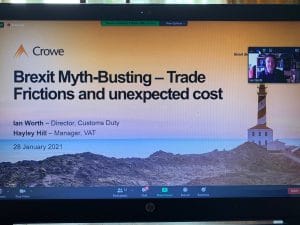BREXIT CHALLENEGS FACING SME’S
The UK economy recorded its worst economic performance for more than 300 years in 2020 as it reeled from the initial shock of the coronavirus crisis before staging a better-than-expected recovery later in the year. Official figures this week showed that the UK produced 9.9 per cent fewer goods and services last year than in 2019, a contraction worse than the 1921 slump after the first world war and Spanish flu. But as companies and households learnt to live with Covid-19 lockdowns, economic performance improved during the year and Britain’s economy grew 1 per cent in the final quarter, the Office for National Statistics said. What impact Brexit will have on top of COVID we have yet to see the full impact. It was reported in the Guardian that exports to the EU were down 68% in January, and we can see the situation getting worse and more onerous on businesses over the coming months as requirements become tighter still.
C2S has hosted two Brexit events one in November 2020 and one February 2021 and it has become increasingly clear that SME’s are facing difficult challenges in getting goods in and out of the UK via the European Community. In some cases, crippling. Some of these are transitional issues but these do not seem to be being resolved quickly enough but some are structural issues which will have long term impacts.
We asked some businesses to articulate their challenges in more detail, from food and furniture manufactures to food exporters and commodity manufacturing. If you have anything you would like to add to the conversation, please let us know as we feed information bac into government: info@circle2success.co.uk
Summary of the key points raised by the businesses we spoke to:
- Customs and customers across the EU were ill prepared and unaware of the new requirements for importing goods from the UK. Generally, we have had no issues getting goods out of the UK until now.
- The cost of freight is increasing (up to 25%) due to the delays across Europe and freight lorries taking significantly longer to offload their goods and return to the UK – this delay can be up to two weeks plus we’ve been finding it difficult to get transport companies to take our products to Europe.
- Export paperwork requirements vary from country to country and we are receiving requests for paperwork that we know is not required – this is increasing the workload for our customer service team significantly, it is also frustrating
- Customers are getting frustrated by the delays – one of our big customers in Poland has had to stop production due to our product being delayed by two weeks – we are concerned that we may start to lose business if this is not resolved soon
- Denmark is the only country where goods are not delayed because they were prepared!
- Additional costs (e.g., costs to clear a £1k order may be £100). Larger volumes of goods may then need to be ordered to dilute the impacts of the import costs, this will impact working capital, cost money in financing charges, lead to physical space constraints and potential additional costs of obsolescence/damage
- The additional costs and the subsequent margin erosion (NB this will impact the wider supply chain not just for parts that are currently imported)
- Potential cost to the business include – Transactional on costs will be in the region of 1%. Risk, quality and performance are harder to measure but will be far greater than 1%. Wider impacts of inflationary pressures driven by the changes are likely to further erode margins, increase risks, and place pressure on liquidity and funding
- Low value shipments are now too costly to despatch from the UK. A consignment worth £70 to a customer in France cost £25 with Fedex to send, plus a further €18 administration charge from Fedex in France which the customer was obliged to pay along with French VAT.
- We are expecting to have to cease supplying small orders from the UK and pass this business to an agent in the EU. More business for the EU = More Jobs created = Less business for UK
- Our goods are a “commodity product” so we work with low margins. If we give up 7%, it is more than 50% of our gross margin.
- Many of our customers in the EU are SME’s and don’t normally import for companies outside the EU. Thus, they do not have customs agents and are not familiar with the procedures or the costs. We even have some larger customers in a similar position. As you can imagine, the majority are requesting that we compensate for their importation costs.
- A further related issue is the VAT which customers must now pay on import. It may only be a “cash-flow” problem but they don’t like it.
- Bank Charges – some EU banks have decided not to follow SEPA rules with regard to bank charges. Banco Sabadell, for example, charged a customer 0.75% of the amount when transferring €20k to us. Prior to 1 January, the cost was zero. We have also learned that some other Spanish banks are following (e.g. Santander – 0.7%).
Key issues in relation to country-of-origin rules:
- The rules vary by destination depending on the trade agreement
- Within each trade agreement the rules vary for each type of product
- Some of the rules relate to the value of raw materials relative to the ex-works selling price so potentially product could be eligible as UK origin at one price and the same identical product may not qualify if it’s sold at a cheaper price
- Raw materials prices, selling prices and exchange rates all fluctuate so where the value of non-originating products is part of the rules it creates a requirement to check every order line, every time you want to despatch it
- There is a lack of information/understanding about how to deal with product that does not meet the conditions to be UK origin, so if for example the product contains a raw material from China and one from Brazil and the rules of origin in a trade agreement don’t allow you to declare it as UK origin, it’s not clear how you should determine the country of origin that should be declared for the end product (ie China or Brazil)
- Freight forwarders do not appear to understand the rules and are insisting on country of origin declarations even when the product itself is not subject to import duty and so there is no preference to be claimed –
- We have had to suspend taking orders from the EU, which represents about 30% of our Retail Direct to Consumer Export business. Couriers have suspended all services, and will not collect any orders. We have also had some 1,500 orders returned to us by couriers.
- Despite having excellent data ourselves, and having exported to the EU successfully for many years, Couriers are finding barriers with customs clearance that they are not able to overcome. We are actively looking at alternative solutions, but we shouldn’t have to go to the lengths of setting up a subsidiary in the Netherlands or Germany, but it now seems like this is a route we may have to take.
- It is not necessary for us to do this with any other Country in the world, and the lack of a trade deal that works for us between the UK and EU may lead to us relocating our operation to the continent – something I’m sure is not in the interests of the UK economy, and the government surely don’t want.
- We have asked HMRC and DiT. HMRC have sent links to the “relevant” pages of their guidance which confirm (as we understand) that the goods are covered by the rules of “preferential origin” and hence can benefit from the preferential rate of duty (i.e. 0%). However, some at the DiT have indicated that the customs people may be right but we should switch to using a procedure called “IPR” and hold goods in a “customs warehouse”. Another has said that even using the “IPR” procedures will not solve the problem.
- Government is very slow to respond, we placed a query with them via the gov website on the 5th Jan asking for clarification how to interpret the rules of origin and despite chasing, we are still waiting for an answer.
- Critically, there is no central place to go on the gov website to lookup country of origin rules by product and by destination, instead you have to read the detail of each individual trade agreement. We need something similar to the EU Access2Markets website that lets you search the rules by commodity code, country of origin and country of destination https://trade.ec.europa.eu/access-to-markets/en/content/










